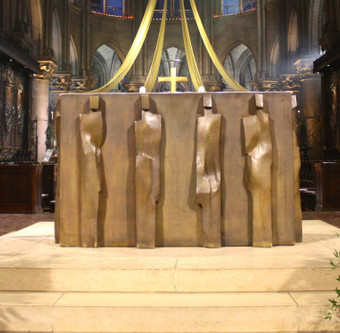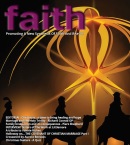
Book Review: Can the priesthood renew society?
Article:
01.11.18
Heroism and Genius: How Catholic Priests helped build – and can help rebuild – Western civilisation by William J. Slattery, Ignatius Press, 272 pp.
reviewed by Richard Whinder
When I saw the title of this book, I imagined it would be a breezy and ‘popular’ treatment of its subject – easy reading, in fact. The reality was slightly different. William J. Slattery is himself a priest and, it is clear, something of a scholar as well. His work was conceived while he was pursuing higher studies in Rome, and the book comes fully equipped with a full range of scholarly apparatus, including a ‘select bibliography’ of some six closely-typed pages. Not quite the ‘easy reading’ I had imagined, then – but a very rewarding read for all that.
Prolonged crisis
Father Slattery’s book is a labour of love, as well as of learning, and it is certainly a timely publication. We live at a time when the Catholic priesthood is experiencing a prolonged period of crisis. The negative impact of secularisation and the shortage in vocations has left many priests disheartened and over-burdened. The confusion over priestly identity which followed in the years after Vatican II continues to have a highly damaging effect. Most devastating of all, of course, has been the fall out from the clerical abuse scandals, which has arguably changed the whole way in which the general public – and even many of the Catholic laity – view their priests. No one can deny that heinous crimes took place, sometimes on a frightening scale. And while it is now clear that this was a problem affecting virtually all institutions, not just the celibate clergy, it is only right that the priesthood should be held to account to a higher standard than other professions. Still, the scandals have been used as a highly convenient tool to undermine not only the clergy and the institutional Church, but the entirety of Christian life and morals – as we see most dramatically in the Republic of Ireland. It is, therefore, not only desirable but urgent to remind people that, not only have the vast majority of priests always lived decent and honest lives, but that a high proportion of them have indeed been capable of ‘heroism and genius’ – and indeed, sanctity, too.
Every Catholic ought to know
Father Slattery’s book is wide-ranging. Broadly speaking it focuses on the Mediaeval period – the age of Christendom – with excursions into the early Church and the Renaissance. Sometimes he is reminding us of stories which every Catholic ought to know, but which are so often overlooked and neglected – the contribution of monasticism to the rebirth of Europe after the fall of Rome, and the complementary efforts of the great Church Fathers to re-establish culture and learning in the West. He gives some emphasis to the court of Charlemagne, and the great work of Alcuin of York – one of the greatest Englishmen in history? – in bringing about the ‘Carolingian Renaissance’ of the ninth century. At other times he tackles less obvious but intriguing subjects – the meaning and value of chivalry (surely due for rediscovery in the age of #metoo and #timesup?) and ‘The Catholic Ideal behind Western Economic Progress’. At all times Fr. Slattery writes with controlled passion, and if his style is occasionally a little involved it well repays any efforts.
The Church and capitalism
Two slight quibbles to conclude. Firstly, our author occasionally allows his enthusiasm to get the better of him. For example, in writing about ‘Western Economic Progress’, Fr. Slattery reveals himself to be a convinced advocate of free market capitalism (perhaps unsurprising in an American citizen). There is, of course, nothing wrong with that. Indeed, it can be argued that the Church in general has always tended to overlook the positive aspects of the capitalist model. True, it does have an in-built tendency to encourage materialism, and to commodify all aspects of human life, even things as intimate as sexuality. But on the other hand it has also done more to raise the most desperate people in the world out of poverty than any other system, while remaining compatible with basic human freedoms (which communism, for example, signally failed to do). It is therefore quite refreshing to see a Catholic priest give a full-bodied defence of the capitalist ideal.
Usury
Arguably, however, Fr. Slattery over-eggs the pudding and ends up telling a rather one-sided story. It is certainly true that there were priests whose writings on economics influenced such luminaries as Freidrich Hayek (and this is a little-known and fascinating chapter in economic history). On the other hand, the mediaeval and renaissance clergy in general could hardly be described as cheerleaders for the modern capitalist model. I was rather taken aback that nowhere in his treatment of this subject does Fr. Slattery attempt a proper explanation of the Church’s teaching on usury, nor does the word ‘usury’ appear even once in the index. Yet throughout the Middle Ages and well into the Counter-Reformation period every Catholic preacher of note railed against the lending of money with interest as a serious sin. Now, a case can certainly be made (and I think legitimately) that there has been a genuine development of doctrine in this area – that the changing nature of society, and of money itself, has altered our understanding of what constitutes ‘usury’, so that the demand for a fair rate of interest is no longer sinful. As I say, I think a strong case can be made for this position – but it needs to be argued, not simply assumed.
The laity
Secondly, the book occasionally attributes to ‘the priesthood’ what might be better ascribed simply to ‘the Church’. True, priests are the shepherds of their flock, and direct much of their activity (certainly in past centuries, anyway). Yet one need not be a radical progressive to believe that the laity do indeed have their own proper activities and sphere of influence – and at times Fr. Slattery is perhaps a little too ready to credit his fellow priests with all the achievements of Western civilisation.
But these are quibbles. This is a finely produced book, richly embellished with black and white illustrations, and it deals with a timely subject in a scholarly but accessible way. It deserves a wide readership.
Notes:
Fr Richard Whinder is a graduate of King’s College London and a priest of the Archdiocese of Southwark; he is Parish Priest of Holy Ghost, Balham.





